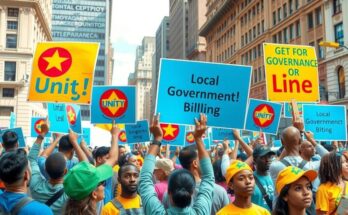The ECOWAS Parliament convened in Lagos to address escalating political instability in Guinea-Bissau and Liberia. Key lawmakers, including Senator Ali Ndume and Billay Tunkara, highlighted the importance of strong leadership, electoral reforms, and proactive parliamentary diplomacy. A new ad hoc committee was formed to tackle immediate issues, with a strong focus on preventing further unrest and ensuring adherence to democratic principles across member states.
During the closing session of the ECOWAS Parliament’s 2025 First Extraordinary Meeting in Lagos, officials expressed grave concerns regarding escalating instability within the region, particularly in Guinea-Bissau and Sierra Leone. Nigerian Senator Ali Ndume, Gambian Fourth Deputy Speaker Billay Tunkara, and Sierra Leonean MP Saa Emerson Lamina stressed the urgent need for proactive measures to protect democracy in these nations, currently facing political crises.
Senator Ndume highlighted the significance of strong leadership in preventing unconstitutional takeovers, stating that a “better option than democracy” exists solely through effective governance. He warned that military coups often arise from public disillusionment with leadership, indicating a pressing need for responsible governance.
The discussions were dominated by fears concerning political tensions in Guinea-Bissau, where the incumbent president’s refusal to resign and conduct elections has raised the specter of another coup. Billay Tunkara emphasized the importance of employing parliamentary diplomacy, asserting that global parliamentary advocacy for diplomatic solutions is essential in addressing ongoing crises.
An ad hoc committee composed of representatives from all member states was established to oversee immediate intervention measures. Saa Emerson Lamina called for proactive early warning systems to prevent the deterioration of conditions, lamenting the exclusion of countries such as Mali, Niger, and Burkina Faso from ECOWAS due to political instability.
Lawmakers underscored the necessity for electoral reforms that ensure transparency and adherence to good governance protocols, with Tunkara insisting that heads of state must enforce compliance with ECOWAS recommendations. He cautioned that should Guinea-Bissau ignore these advisories, the intervention of regional leadership would be necessary.
In essence, the ECOWAS leaders find themselves at a crucial juncture, tasked with the significant responsibility of preserving democracy and fostering regional unity in the face of growing instability.
The establishment of a new committee by the ECOWAS Parliament signifies a proactive approach to addressing the political crises in Guinea-Bissau and Liberia. Lawmakers emphasize the imperative of strong leadership, parliamentary diplomacy, and electoral reforms to maintain democratic institutions. The collaborative efforts among member states are vital to avert further instability, reinforcing the need for effective governance and adherence to established political agreements. The actions taken in this pivotal moment will determine the future of regional stability and unity.
Original Source: www.pulse.ng




